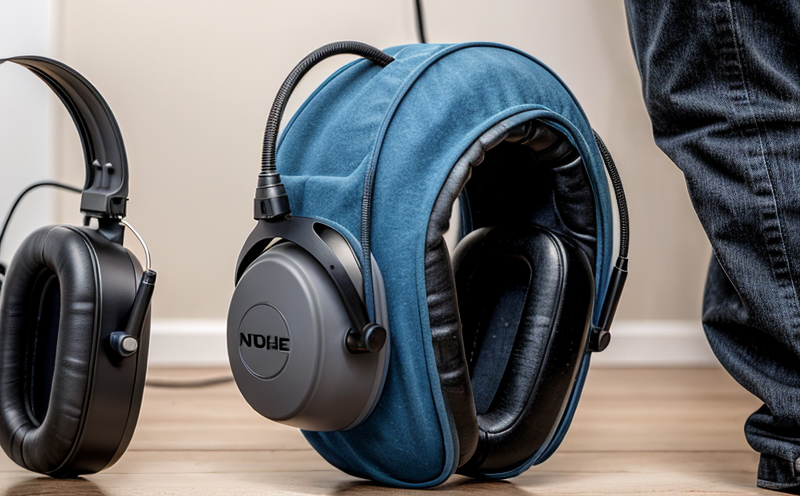CSA Z107.58 Communications Headset Testing
The CSA Z107 series of standards is dedicated to protecting workers in various occupational settings by ensuring that protective equipment meets stringent safety and performance criteria. Among these, CSA Z107.58 specifically addresses the testing requirements for communications headsets used in high-noise environments. This standard ensures that such devices provide effective communication and protection against hazardous noise levels.
Compliance with CSA Z107.58 is crucial for industries where workers are exposed to continuous or intermittent noise that could exceed safe levels, such as construction, manufacturing, mining, and any setting involving heavy machinery operations. The standard sets out detailed procedures for testing the performance of communications headsets in terms of sound isolation, communication clarity, and environmental sealing.
The testing process involves several critical steps to ensure compliance with CSA Z107.58. These include:
- Sound Isolation: Measuring the noise reduction provided by the communications headset under specified conditions.
- Communication Clarity: Assessing the quality of sound transmission and reception, ensuring that communication is clear even in noisy environments.
- Environmental Sealing: Evaluating the ability of the headset to prevent external noise from entering and internal sound from escaping.
The testing laboratory must have specialized equipment capable of simulating real-world working conditions. This includes anechoic chambers for measuring sound isolation, acoustic booths for evaluating communication clarity, and environmental chambers that mimic various workplace environments.
Once the tests are conducted, detailed reports are generated, providing a comprehensive analysis of each headset’s performance against CSA Z107.58 requirements. These reports serve as critical tools for quality managers, compliance officers, R&D engineers, and procurement teams to ensure that they meet regulatory standards and enhance workplace safety.
Understanding the nuances of CSA Z107.58 is essential for any organization involved in occupational safety and protective equipment testing. This standard not only ensures worker safety but also contributes significantly to reducing noise-induced hearing loss, a prevalent issue in many industries.
The importance of compliance with this standard cannot be overstated. It underscores the commitment to protecting workers from hazardous noises while enabling effective communication, which is vital for maintaining productivity and safety in high-risk environments.
Applied Standards
The CSA Z107.58 standard is part of a broader series designed to address various aspects of protective equipment, with each standard focusing on specific components or scenarios. For communications headsets, the key aspects addressed include:
- Sound Isolation: Ensuring that the headset effectively reduces ambient noise.
- Communication Clarity: Guaranteeing clear and intelligible communication in noisy environments.
- Environmental Sealing: Protecting against external noises while maintaining internal sound integrity.
The standard is based on internationally recognized guidelines, including ISO 1999-2:2016 for noise measurement techniques and IEC 62631-5 for audio equipment. These international standards provide a robust framework that ensures consistency and reliability in testing procedures.
Compliance with CSA Z107.58 is mandatory for manufacturers, suppliers, and users of communications headsets in regulated industries. By adhering to this standard, organizations can ensure that they meet the highest safety and performance standards, thereby protecting workers and enhancing operational efficiency.
International Acceptance and Recognition
- The CSA Z107.58 standard is widely recognized in Canada and is increasingly being adopted by other countries as a benchmark for occupational safety standards.
- Many international organizations, including the International Labour Organization (ILO) and the World Health Organization (WHO), reference this standard in their recommendations for workplace noise control.
The acceptance of CSA Z107.58 is not confined to a single region; it has gained traction globally due to its comprehensive approach to occupational safety and protective equipment testing. This recognition underscores the importance of consistent and rigorous standards across different jurisdictions.
For organizations seeking to expand their operations internationally, compliance with CSA Z107.58 can serve as a stepping stone towards meeting broader international standards such as ISO 4869-2:2013 or EN 375 for hearing protection devices and noise control.
The widespread acceptance of this standard also ensures that the testing process is standardized, leading to more reliable results across different markets. This consistency is crucial for companies operating in multiple regions, as it simplifies compliance and enhances trust among stakeholders.
Use Cases and Application Examples
- In construction sites where heavy machinery operates continuously, CSA Z107.58 ensures that workers can hear critical safety instructions despite loud background noise.
- In manufacturing plants with high-decibel operations, the standard helps in maintaining clear communication between supervisors and employees.
CSA Z107.58 is particularly relevant for industries where noise levels exceed safe limits, potentially leading to hearing damage or compromised communication. By ensuring that communications headsets meet these stringent requirements, organizations can significantly reduce the risk of occupational hazards.
The standard’s application extends beyond just reducing noise-induced hearing loss; it also enhances operational efficiency by enabling clear and reliable communication in challenging environments. This is especially critical in emergency situations where quick and accurate communication can mean the difference between safety and disaster.
For example, in a mining operation with extensive underground workings, CSA Z107.58 ensures that miners can hear critical updates from surface personnel while also being protected against excessive noise levels deep within the mine.





